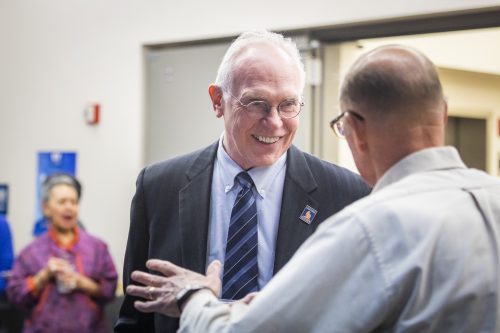Friday Focus: Success through strategy, cooperation, creativity
September 12, 2019

— by Larry Hinzman, vice chancellor for research
In July of this year, the UA Board of Regents directed the University of Alaska to seek out opportunities for research focusing on the long-term investment for Alaska and the world. The recent compact between the governor of Alaska and the BOR explicitly states that the university will strive to increase research income (PDF).
In addition, one of our UAF goals as we look to the future is to achieve Tier 1 research status.
Despite five years of budget reductions, our research activity continues to increase. It is important to recognize the research needs on the distant horizon and prepare ourselves to be in the best position to respond to those opportunities. Such preparation and readiness for opportunities depends less upon visionary prophecy and more upon being at the forefront of excellent science and directing the spearhead of discovery. Our researchers are well-known as global experts on a wide array of topics, and they are often called upon to set the agenda for the next decade of scientific investments.
While our reputation of excellence helps attract both great people and opportunities to our university, it requires drive, innovation and sheer hard work to win the research grants. The decreased state support for our researchers and increased competition from universities across the nation add to the difficulty of securing grants. There are, however, numerous strategies that we employ to increase our probability of success.
The process and strategy of applying for research grants has some parallels to the approach all of us must take to ensure the future success of the university. Researchers must carefully evaluate agencies’ “announcements of opportunity” to ensure their proposal concepts are appropriate and well-targeted. They must consider the level of competition and decide if our efforts are better-placed elsewhere. If other UAF colleagues are submitting proposals for the same grant, they should consider if pooling efforts would decrease competition and enhance the probability of success. They can also seek lesser-known opportunities where competition may be less, and also thereby diversifying our funding portfolio. (UAF subscribes to a service that provides information on funding opportunities available to our faculty.)
That same targeted approach can be applied to any other activity we undertake, whether in student and employee recruitment, academic program development, infrastructure changes, etc. Are we competing for the same limited resources while ignoring productive opportunities elsewhere?
Successful grant writers know that the key to securing grants is to submit strong proposals. They ask their mentors, colleagues and students to help refine ideas and text. They write, review, revise, repeat. They help each other be successful by collaborating and sharing ideas, data and resources. Experienced researchers mentor others. Success begets success, so they share it.
In research, as in every other aspect of the university — and as in life — the dividends of helping others pays out multifold.
Friday Focus is a column written by a different member of UAF’s leadership team every week.


